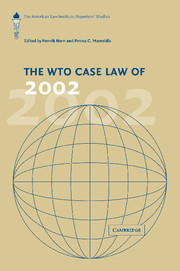Book contents
- Frontmatter
- Contents
- Foreword
- A note on the American Law Institute
- List of reporters
- 1 Introduction
- 2 United States – Section 129(c)(1) of the Uruguay Round Agreements Act (WTO Doc. WT/DS22/R of 15 July 2002): Beating Around (The) Bush
- 3 United States – Tax Treatment for “Foreign Sales Corporations” Recourse to Arbitration by the United States Under Article 22.6 of the DSU and Article 4.11 of the SCM Agreement (WT/DS106/ARB): A Comment
- 4 United States – Countervailing Duties on Certain Corrosion-Resistant Carbon Steel Flat Products from Germany (WTO Doc. WT/DS213/AB/R): The Sounds of Silence
- 5 United States – Countervailing Measures Concerning Certain Products from the European Communities (WTO Doc. WT/DS212/AB/R): Recurring Misunderstanding of Non-Recurring Subsidies
- 6 Canada – Export Credits and Loan Guarantees for Regional Aircraft (WT/DS222/R): A Comment
- 7 United States – Definitive Safeguard Measures on Imports of Circular Welded Carbon Quality Line Pipe From Korea
- 8 Chile – Price Band System and Safeguard Measures Relating to Certain Agricultural Products
- 9 India – Measures Affecting the Automotive Sector
- 10 United States – Section 211 Omnibus Appropriations Act of 1998 (WT/DS176/AB/R): A Comment
- 11 United States – Preliminary Determination with Respect to Certain Softwood Lumber from Canada: What is a Subsidy?
- 12 European Communities – Trade Description of Sardines: Textualism and its Discontent
- Index
1 - Introduction
Published online by Cambridge University Press: 06 July 2010
- Frontmatter
- Contents
- Foreword
- A note on the American Law Institute
- List of reporters
- 1 Introduction
- 2 United States – Section 129(c)(1) of the Uruguay Round Agreements Act (WTO Doc. WT/DS22/R of 15 July 2002): Beating Around (The) Bush
- 3 United States – Tax Treatment for “Foreign Sales Corporations” Recourse to Arbitration by the United States Under Article 22.6 of the DSU and Article 4.11 of the SCM Agreement (WT/DS106/ARB): A Comment
- 4 United States – Countervailing Duties on Certain Corrosion-Resistant Carbon Steel Flat Products from Germany (WTO Doc. WT/DS213/AB/R): The Sounds of Silence
- 5 United States – Countervailing Measures Concerning Certain Products from the European Communities (WTO Doc. WT/DS212/AB/R): Recurring Misunderstanding of Non-Recurring Subsidies
- 6 Canada – Export Credits and Loan Guarantees for Regional Aircraft (WT/DS222/R): A Comment
- 7 United States – Definitive Safeguard Measures on Imports of Circular Welded Carbon Quality Line Pipe From Korea
- 8 Chile – Price Band System and Safeguard Measures Relating to Certain Agricultural Products
- 9 India – Measures Affecting the Automotive Sector
- 10 United States – Section 211 Omnibus Appropriations Act of 1998 (WT/DS176/AB/R): A Comment
- 11 United States – Preliminary Determination with Respect to Certain Softwood Lumber from Canada: What is a Subsidy?
- 12 European Communities – Trade Description of Sardines: Textualism and its Discontent
- Index
Summary
The project
This is the second in the series of Reporters' Studies emanating from the American Law Institute (ALI) project Principles of Trade Law: The World Trade Organization (WTO). The aim of the project is to provide systematic analysis of WTO law based in both Economics and Law. Such an interdisciplinary approach is in our view necessitated by the fact that the WTO Agreement has inherently economic objectives, which is not to deny that it may have other objectives as well.
A fundamental methodological problem facing the project is the lack of a “manual” for how to perform a joint economic and legal analysis of the WTO contract; there is no field, “The Economics of Trade Law,” that can be relied upon for the purpose of the project. The relevant specialized fields, such as International Trade Law and International Economics, instead differ widely, both in terms of aims and in terms of method, and lawyers and economists are typically too specialized in their respective fields to be able to undertake a legal-cum-economic analysis of the law by themselves. Instead, such an analysis requires the joint efforts of economists and lawyers. The main idea behind this project is to develop such collaboration.
The project undertakes yearly analysis of the case law from the adjudicating bodies of the WTO. The intention is each year to analyze all disputes that in the previous year came to an administrative end, either because they were not appealed or because they went through both the panel and the Appellate Body (AB) stages, even though time constraints may prevent us from covering each and every dispute that falls into this category.
- Type
- Chapter
- Information
- The WTO Case Law of 2002The American Law Institute Reporters' Studies, pp. 1 - 11Publisher: Cambridge University PressPrint publication year: 2005

